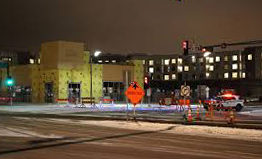
The first I heard, it was a fire inside a building. Later on, last Tuesday evening, I learned it was an explosion. Then, it was two explosions. Next, that the blasts had occurred in the same community where I was about to present one of my Remembrance talks, last Wednesday night. But I never felt as if I were in any real danger until I learned that the RCMP had become involved.
“RCMP have cordoned off the area around Festival Way in Sherwood Park,” the CBC News story reported Wednesday morning.
If that community – Sherwood Park– sounds a bit familiar, it should. It’s a satellite town near the City of Edmonton. And it’s the place where last Tuesday evening, according to police, a young man set off two bombs inside a public parking garage, and one of the bombs severely damaged the car he had driven there.
The RCMP reported that first responders took the man who’d set the bombs to hospital where he later died. None of this really registered in my head until I realized that Festival Way and this parkade were located right next door to the theatre where I was scheduled to speak Wednesday evening, the next night.
“Your talk is cancelled, Ted,” explained Gavin Farmer, the CEO of the Festival Place on Wednesday. “In fact, the theatre is off-limits for the next two days, which means both your talks are cancelled.”
When I stopped being disappointed and angry about having two of my planned talks about Canadian wartime stories cancelled, I realized instead of being angry, I should be counting my lucky starts that I wasn’t actually in the theatre when this guy’s parkade bombs exploded. In fact, Mary Walsh, Canadian star of “This Hour Has 22 Minutes” was part-way through her show on that same stage the night of the bombings, and she was forced to halt her show and lead her audience of about 500 patrons out of the theatre to safety.
“All of a sudden there were police with flak jackets and high-powered rifles in the theatre telling us we had to evacuate the place and escorting us out of the theatre,” Walsh told reporters.
I think that’s about as close as I’ve ever come to what might be called a random act of violence. It’s odd, because even 40 years ago when I was training to be a journalist, we were taught to expect the unexpected, and to teach ourselves to be vigilant wherever we searched out stories. But, all the years of violence since 9/11 have taught most of us that being vigilant doesn’t really matter.
Random violence tends to surprise everybody, especially in Canada. Consider the violent events in and around Toronto over the past months – the van rampage on Yonge Street, the restaurant shootings on the Danforth. Nobody ever considered such arbitrary violence would come to the GTA. But it has. To the credit of Toronto civic leaders and the public itself, however, such acts of indiscriminate violence have not prevented the general population from carrying on work and play as normal. But even when you expect, it surprises you.
I remember reading the account of Scott Taylor, the former Canadian soldier later publisher of Esprit de Corps magazine, being kidnapped in Iraq in 2004. He’d gone to the centre of American operations in the city of Talafar, where soldiers, police and special forces on both sides could easily be prowling.
Working with a Turkish guide Taylor had studied the territory he was entering; he had consulted experts who was on what side. But suddenly the experienced soldier now reporter found himself surrounded by masked gunmen, he presumed were special forces escorting him. He was detained and threatened.
“They came straight for me and had me against a wall to be shot,” Taylor recalled. “(His guide) yelled, ‘Don’t shoot him. He has a son!’” Just then, the special forces commander arrived and ordered the execution halted. “The execution scenario passed too quickly for me to fully react, but as I became resigned to my fate, I found it easier.” He was eventually released and published his experiences in his book, “Unembedded: Two Decades of Maverick War Reporting,” in 2009.
This all seems to pale every time bulletins or 24-hour newscasts take us to another mass shooting just around the corner. The victims – whether students in a school shooting, patrons in a club massacre or pedestrians caught in the crossfire on a street – generally describe their ordeals using such words as “Kids are supposed to be safe in a school…” or “Who’d have thought a night out could be a death sentence?” or “It can’t happen here!”
I don’t consider my close encounter with a parkade bomber at all like the mass shootings in the U.S., but it does give one pause to think that a country we’ve considered so safe, so sane, so peaceable as ours, might not be anymore.